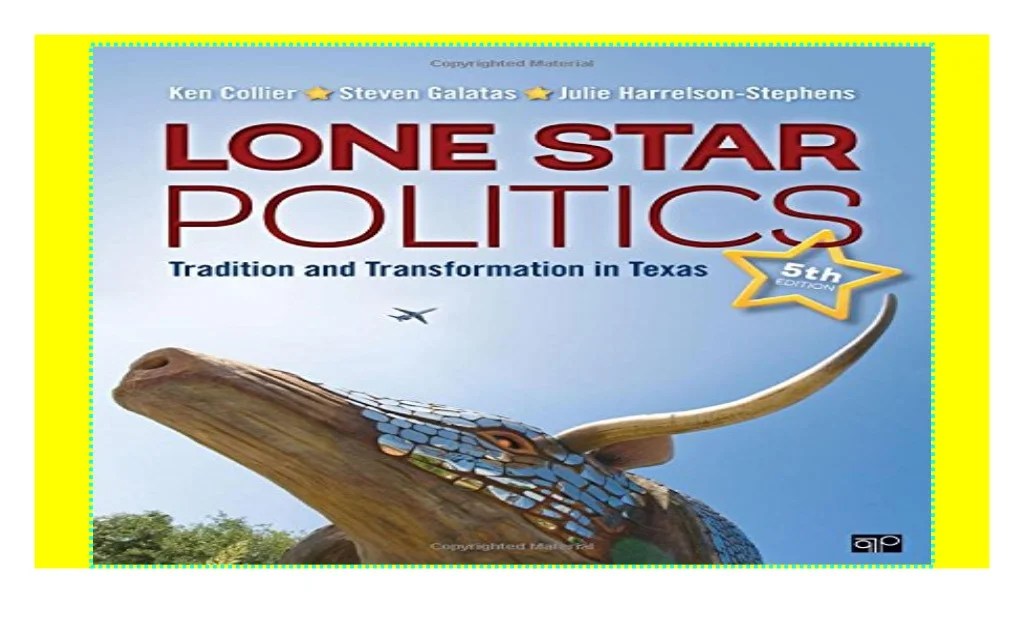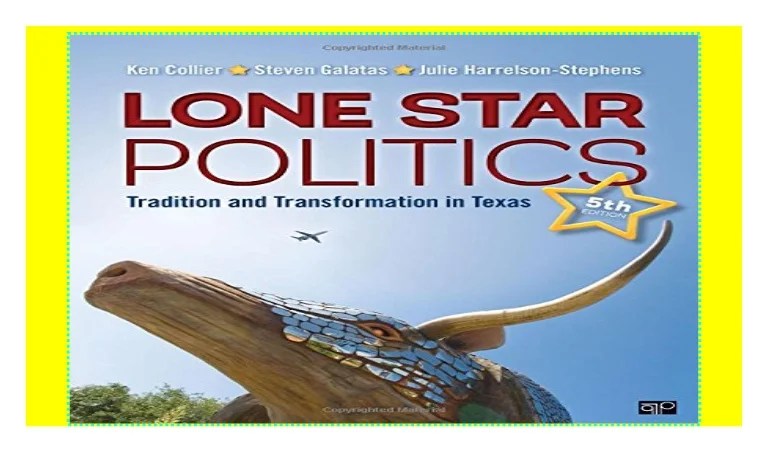Lone star politics tradition and transformation in texas 7th edition – Lone Star Politics: Tradition and Transformation in Texas, 7th Edition delves into the captivating political landscape of Texas, tracing its historical roots and examining the transformative forces that have shaped its present. This comprehensive work provides a profound understanding of the Lone Star State’s unique political culture, its key players, and the pressing issues that continue to mold its future.
From its origins as a frontier territory to its emergence as a modern political powerhouse, Texas has witnessed a remarkable evolution. This book meticulously analyzes the factors that have contributed to this transformation, exploring the interplay of demographics, economics, and social change.
It sheds light on the enduring traditions that have defined Texas politics while also highlighting the innovative approaches that are reshaping its electoral landscape.
Lone Star Politics: A Historical Overview

Texas’s political culture is a unique blend of influences, including its Spanish colonial heritage, its status as a former independent republic, and its strong frontier tradition. Key events in Texas history, such as the Texas Revolution, the Civil War, and the discovery of oil, have shaped its political landscape.
Texas’s political culture has also been influenced by its large and diverse population, which includes a significant Hispanic population and a growing number of Asian and African American residents.
Origins and Development of Texas’s Political Culture
Texas’s political culture has its roots in the state’s Spanish colonial heritage. The Spanish established a system of government in Texas that was based on the principles of Catholicism and authoritarian rule. After Texas gained its independence from Mexico in 1836, it adopted a constitution that reflected the values of its Anglo-American settlers.
This constitution established a strong governor and a weak legislature, and it enshrined the principles of individual liberty and limited government.
Key Events and Figures in Texas Politics
The Texas Revolution was a watershed event in the state’s history. The revolution led to the establishment of the Republic of Texas, which was an independent nation for nearly a decade. The Republic of Texas was annexed by the United States in 1845, and Texas became a state in 1846. The Civil War was another major event in Texas history.
Texas seceded from the Union in 1861 and joined the Confederate States of America. After the war, Texas was readmitted to the Union in 1870.
Impact of Texas’s Political Culture on Its History
Texas’s political culture has had a significant impact on its history. The state’s strong tradition of individualism and self-reliance has led to a distrust of government and a preference for limited government. Texas’s political culture has also contributed to the state’s economic development.
The state’s low taxes and regulations have attracted businesses from all over the country.
The Transformation of Texas Politics: Lone Star Politics Tradition And Transformation In Texas 7th Edition

Texas politics has undergone a significant transformation in recent decades. The state has become more urban and diverse, and its economy has shifted from agriculture to services. These changes have led to a decline in the influence of rural areas and an increase in the influence of urban areas.
The state has also become more politically competitive, with both major parties having a chance to win statewide elections.
Major Changes in Texas Politics, Lone star politics tradition and transformation in texas 7th edition
One of the most significant changes in Texas politics in recent decades has been the growth of the Hispanic population. The Hispanic population in Texas has grown from 12% in 1980 to 39% in 2020. This growth has led to an increase in the political power of Hispanic voters.
Another major change in Texas politics has been the decline of the Republican Party. The Republican Party has been the dominant party in Texas for decades, but its support has declined in recent years. The party has lost ground among Hispanic voters and urban voters.
Factors Contributing to These Changes
The growth of the Hispanic population and the decline of the Republican Party are just two of the factors that have contributed to the transformation of Texas politics. Other factors include the state’s changing economy and the increasing political competitiveness.
The state’s economy has shifted from agriculture to services, which has led to a decline in the influence of rural areas. The state has also become more politically competitive, with both major parties having a chance to win statewide elections.
Impact of These Changes on Texas Politics and Governance
The transformation of Texas politics has had a significant impact on the state’s politics and governance. The growth of the Hispanic population has led to an increase in the political power of Hispanic voters. The decline of the Republican Party has made the state more politically competitive.
These changes have made it more difficult for the Republican Party to pass its agenda.
Frequently Asked Questions
What are the key themes explored in Lone Star Politics: Tradition and Transformation in Texas, 7th Edition?
The book examines the historical evolution of Texas politics, the factors driving its transformation, the key issues facing the state, the role of political parties, the electoral process, and the challenges and opportunities shaping its future.
How does the book approach the study of Texas politics?
The book takes a comprehensive approach, combining historical analysis with contemporary insights. It draws on a wide range of sources, including archival research, interviews with political actors, and statistical data.
What is the significance of the 7th edition of Lone Star Politics?
The 7th edition provides an updated and expanded examination of Texas politics, incorporating the latest research and developments in the state’s political landscape.

